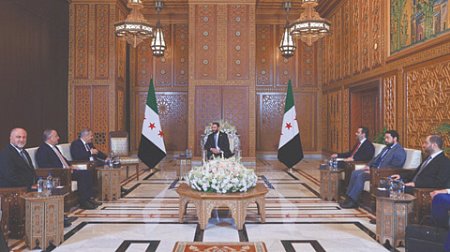
Tensions are escalating in Syria as Turkey’s Ministry of Defense on August 7 accused Kurdish forces of violating a key integration agreement with the new transitional government in Damascus. Ankara believes that recent deadly clashes between Druze and Bedouin militias in the country’s south have emboldened the Kurds, reinforcing their determination to fight for autonomy rather than assimilate into the new state structure. A Turkish defense official warned that Kurdish-led Syrian Democratic Forces (SDF) are now attempting to establish a corridor from their northeastern heartlands to the Druze-populated south, a move Ankara vehemently opposes.
This marks a sharp reversal from a March memorandum where Kurdish leaders had agreed to integrate the SDF into a unified Syrian army. Following the recent violence in the Suwayda province, SDF Commander Mazlum Abdi has abandoned talk of disarmament, insisting on a decentralized political system for Syria. “After 14 years of conflict, Syria cannot return to its previous state,” Abdi stated, arguing that the nation can no longer be a centralized, totalitarian regime. He further challenged the country’s identity, suggesting the word “Arab” has no place in its official name given its ethnic diversity.
The diplomatic fallout is growing. Turkish Foreign Minister Hakan Fidan has reportedly conveyed Ankara’s grave concerns directly to Damascus’s new leader, Ahmed al-Sharaa. Turkey, a primary backer of the transitional government, views any push for Kurdish autonomy as a direct threat to Syria’s sovereignty. A spokesperson for President Erdoğan’s ruling party stated, “We are observing clear delays and steps that distort the course of events and are directed against the unity and sovereignty of Syria.” Meanwhile, U.S. efforts to mediate, including a recent visit by special envoy Tom Barrack, have so far failed to bring the Kurdish leadership and the Damascus government to the negotiating table.
Underlying the crisis is deep-seated distrust in the composition of Syria’s new national army. Israeli officials, speaking anonymously, described the force as a mere “rebranding” of former radical factions, not a conventional military. An analysis by the Israeli think tank Alma, which focuses on the region, noted that most insurgent groups have joined the new army without truly disbanding, creating independent power centers that threaten Damascus’s long-term control. The report highlighted that many fighters adhere to ideologies aimed at imposing Sharia law and eliminating minorities, a fact that only strengthens the resolve of groups like the Kurds to maintain their own armed forces for self-preservation.
This fragile situation has prompted dire warnings of renewed and widespread violence. A recent forecast by Stratfor, a US-based geopolitical intelligence firm, suggests that Syria is likely to witness fresh uprisings from minority groups and continued fragmentation of its security apparatus. The report concludes that the path to genuine national unity is stalled, particularly as international powers continue to intervene. If the upcoming parliamentary elections in September consolidate the power of the current leadership, analysts fear it could trigger a new wave of ethno-confessional conflict across the war-torn country.
